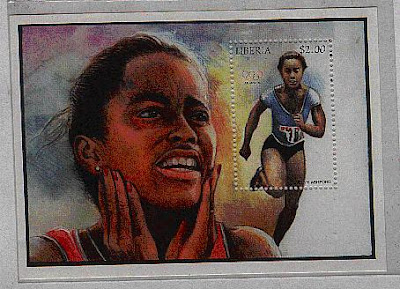 Technical Details (of stamps below)
Technical Details (of stamps below)
Title: 100th Anniversary of the Modern OLympic Games 1896-1996Reason for Issue: To promote awareness of the Olympic Games and the participation undertaken by the citizens of BARBADOS.Values: Stamps 20c, 30c, 55c and $3.
---------Souvenir Sheet $2.50Designer: Steve Noon, Garden StudioPrinter: COT Printery Ltd of BARBADOSProcess: Lithography
Stamp size: 28.45 X 42.58 mmPane:
50 (2x25)
Perforation: 14 per 2 cmPaper: CA Spiral Watermarked PaperSouvenir Sheet Size: 70X 90mm Portrait formatRelease Date: 2nd April 1996

Olympic Games Postage Stamps
The ancient Games in Greece evolved from legendary conflicts among the Greek gods and the religious ceremonies held in their honour. According to historical records the first Olympian Games were held in 776 BC, but competitions appear to have been held on an unofficial basis long before this.
The Games were held at Olympia, which lies in the plain of Elis, on the banks of the river Alpheus. Initially there was only one event, the "stade" race, which comprised a sprint of 192.27 metres, reputedly 60 times the length of Hercules foot. Other sports were introduced at later date, including the pentathlon which consisted of running, jumping (with the aid of hand held weights), throwing the discus, javelin and wrestling. Chariot racing and boxing were included later.
Victors in the early Games were crowned with wild olive leaves, but they were often richly rewarded by their home states, and some became very wealthy. For reasons not fully understood today, women and slaves were strictly forbidden, under pain of death, from attending the Games.
The Roman Emperor, Theodosius 1 abolished the Games in AD393 because at that time he had banned all religious ceremonies. The Temple of Zeus was burned down in AD426 and in AD521 an earthquake left the area bare except for rubble. Finally, the River ALpheus flooded and buried the entire area under mud and water.
The founder of the Modern Olympic Games is held to be a French noblemean, Baron Pierre de Coubertin. His concept of a revived Games was first prpounded publicly at a lecture at the Sorbonne in Paris on 25 November 1892. In June 1894 he convened an International Conference at Sorbonne, and on 23 June a resolution called for the revival of the Games. They were held every fourth year, the four year period to be known as an Olympiad. At the instigation of Demetrius Vikelas of Greece (the first President of the International Olympic Committee) Athens was selected to host the first Games in 1896.
Greece released the first set of Olympic Games stamps, which included, inter-alia, designs showing boxers taking part in the Ancient Games, and the discus thrower from the famous statue of Myron. The two top values showed the Stadium and the Acropolis. The issue date was 25 March 1896, although the Games did not commence until 6 April 1896. The 12 day difference is accounted for by the fact that the Greeks, at that time, were still using the old Gregorian calendar.
The Games were oficially opened by King George 1 of Greece at the invitation of his son, Crown Prince Constantine, who was the President of the Organizing Committee. The United States were the most successful nation, winning eleven gold medals, one more than the Host Nation, Greece.
The Games proved very popular with the Greek public, but despite strong Greek pressure for the exclusive rights to organize future Games, Baron Pierre de Coubertin won agreement to hold the 1900 Games in Paris.
 Centenary of the Modern Olympic Games. Mint stamps (20c, 30c, 55c and $3)
Centenary of the Modern Olympic Games. Mint stamps (20c, 30c, 55c and $3)
 Mini Souvenir sheet with Discus Thrower on the $2.50 stamp.
Mini Souvenir sheet with Discus Thrower on the $2.50 stamp.
On the Sheet: 100 years of Olympic Games Stamp Designs.




 Centenary of the Modern Olympic Games. Mint stamps (20c, 30c, 55c and $3)
Centenary of the Modern Olympic Games. Mint stamps (20c, 30c, 55c and $3) Mini Souvenir sheet with Discus Thrower on the $2.50 stamp.
Mini Souvenir sheet with Discus Thrower on the $2.50 stamp. ATLANTA 1996
ATLANTA 1996 Discus Thrower
Discus Thrower Olympic Stamps (1996) from HongKong. A co-host city for some events in the 2008 Beijing Olympics
Olympic Stamps (1996) from HongKong. A co-host city for some events in the 2008 Beijing Olympics
 One of our previous items in our auctions
One of our previous items in our auctions
